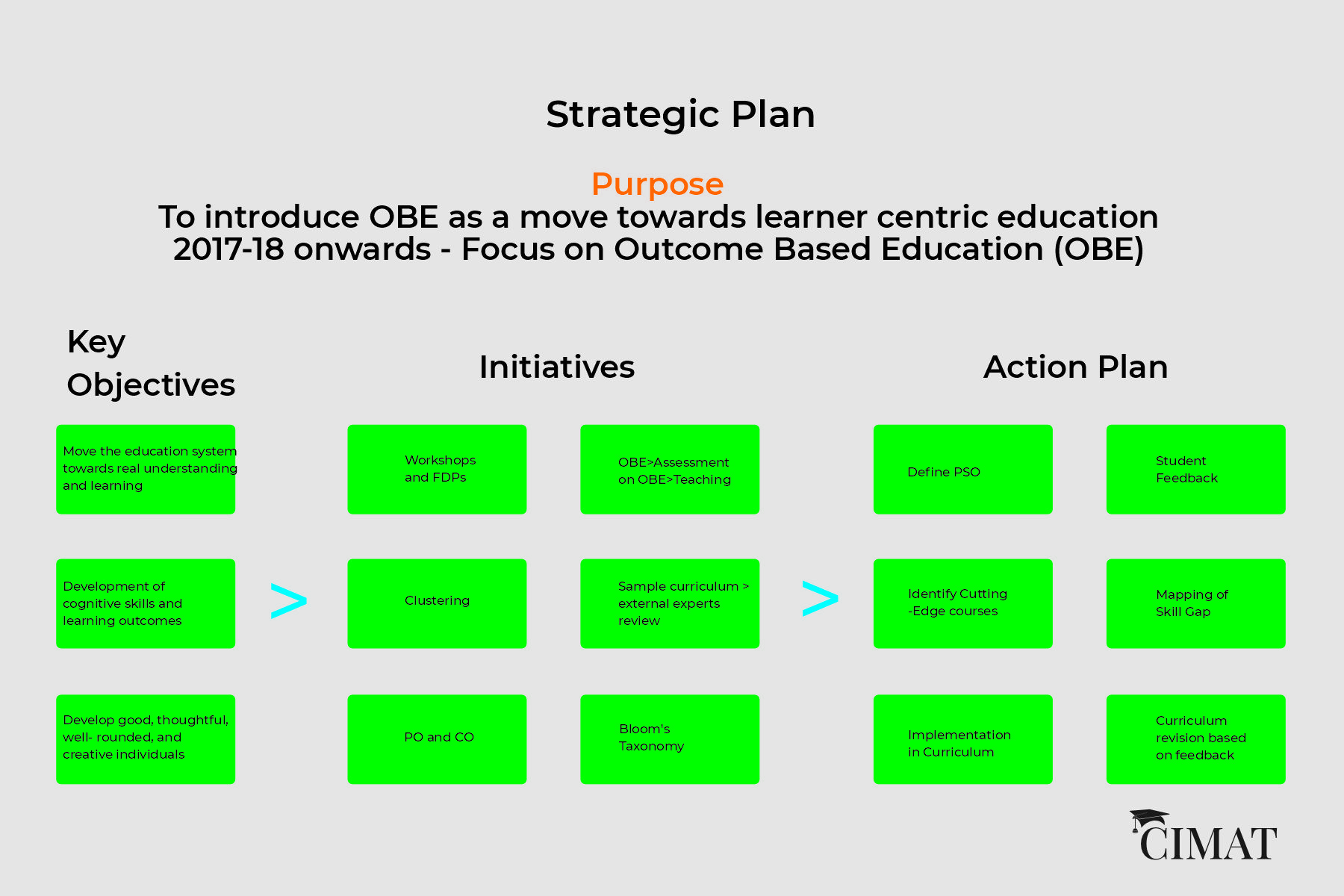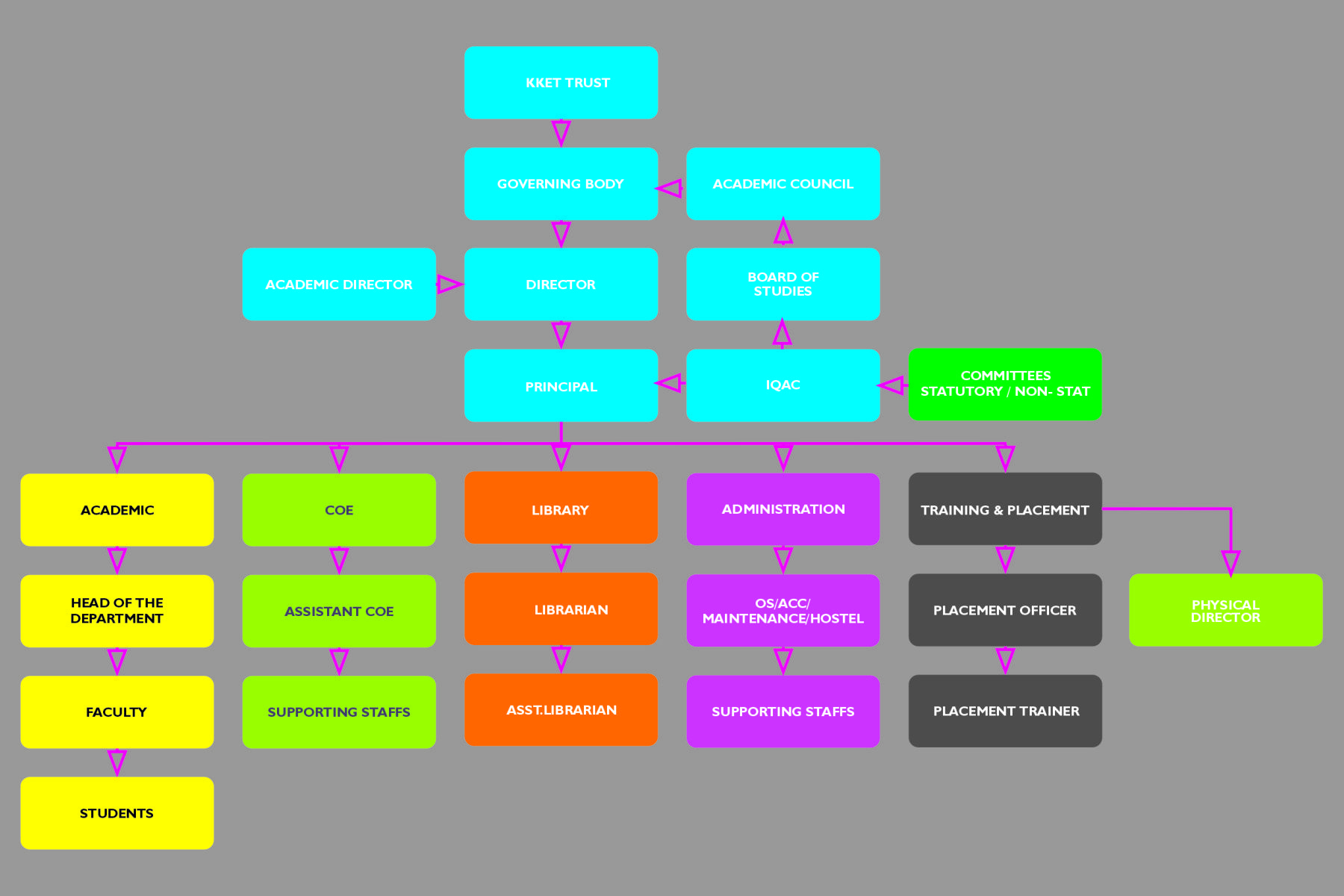IQAC
QUALITY POLICY
Coimbatore Institute of Management and Technology (CIMAT), is committed to provide a conducive academic environment for creating competent, self-reliant and socially responsible professionals to meet the emerging needs of the industry and society by continually improving the teaching standards and infrastructure.
OBJECTIVES
✓ To impart relevant knowledge with due emphasis on learner-cantered processes
✓ Priority to value-based education
✓ To develop job-oriented and administrative skills
✓ To preserve ethical codes and our national cultural heritage
COMPOSITION
IQAC MEMBERS
| S.No | Name | Designation |
|---|---|---|
| 1 | Dr.V.Latha | Chairperson/Head of the Institution |
| 2 | Dr.S.Ramachandran | Internal Member/Senior Faculty |
| 3 | Dr.Madhumitha.M | Internal Member/Senior Faculty |
| 4 | Dr.V.Gayathri | Internal Member/Senior Faculty |
| 5 | Dr.K.A.Chinnaraju | Internal Member/Member from Management |
| 6 | Ms.M.Mallika | Internal Member/Senior administrative officer |
| 7 | Shri.M.Thangavelu | Internal Member/Management Trustee |
| 8 | Shri.S.Subramanian | External Member/Local Society |
| 9 | Ms. JR.Adhisaya Mariam | Internal Member/Student Representative |
| 10 | Dr.S.Karthikeyan | External Member/Alumni |
| 11 | Dr.P.Natarajan | Internal Member/Employer |
| 12 | Mr.M.Viswanathan | External Member/Industry |
| 13 | Mr.Jones Mohammed | External Member/Stakeholder |
| 14 | Dr.Y.Babu Vinothkumar | IQAC coordinator |
AQAR
Annual Quality Assurance Report – (AQAR) is a yearly report, which should be submitted to NAAC every year by all Accredited Institutions as per the format prescribed. The AQAR period would be the Academic Year. AQAR would be helpful to know the improvements of the institution after the accreditation. It is a useful document which gives overall picture of the institutional growth in all the seven criteria identified by NAAC. It also provides systematic data with respect to various improvements to be taken up by the institution. The report details the tangible results achieved in key areas, specifically identified by the institutional IQAC at the beginning of the academic year.
AQAR submission is necessary requirement of NAAC Reaccreditation, being one of the Eligible criteria. During the institutional visit the NAAC peer teams will interact with the IQACs to know the progress, functioning as well quality sustenance initiatives undertaken.
ACADEMIC CALENDAR
An academic calendar is prepared by the concerned official at the beginning of each semester consisting of various curricular, extra and co-curricular activities. The calendar is uploaded on college website, displayed on notice boards and is communicated to students through emails. It is updated and revised with respect to any changes suggested by the university. All the classes and examinations are planned as per the calendar, thus ensuring complete adherence.
FEEDBACKS
The institute-initiated stakeholder feedback policy for continuous improvement in curriculum design. The main purpose of this policy is to collect the stakeholders’ perceptions of the effectiveness of the curriculum. Feedback is collected from the stakeholders such as Students, Faculty, Alumni and Parents. It is carried out in different modes like online feedback through
Google forms, Institute’s CMS portal and written feedback. The collective feedback of all the stakeholders was analysed and a consolidated report/Action Taken Report of the recommendations is prepared.
Feedback Analysis report on Curriculum from Stakeholders
| # | ACADEMIC YEAR | 2022-23 | 2021-22 | 2020-21 | 2019-20 | 2018-19 |
|---|---|---|---|---|---|---|
| 1 | STUDENT | [View] | [View] | [View] | [View] | [View] |
| 2 | TEACHER | [View] | [View] | [View] | [View] | [View] |
| 3 | EMPLOYER | [View] | [View] | [View] | [View] | [View] |
| 4 | ALUMNI | [View] | [View] | [View] | [View] | [View] |
| 5 | PARENT | [View] | [View] | [View] | [View] | [View] |
Feedback Action taken report on Curriculum from Stakeholders
ICT
Today, it is essential for the students to learn and master the latest technologies in order to be corporate ready. As a consequence, teachers are combining technology with traditional mode of instruction to engage students in long term learning. College uses Information and Communication Technology (ICT) in education to support, enhance, and optimize the delivery of education. The faculty used various ICT enabled tools to enhance the quality of teaching-learning like,
The faculty members used Google meet or zoom to conduct tests and for lecture delivery. Also used many interactive methods for effective teaching such as PPT with animations, Video clippings, Use of online resources from NPTEL, Coursera, YouTube links, Simulation tools, Virtual labs, online assessment tools like mentimeter - Quizz.com, and various Cloud portals etc.
WhatsApp group used as platforms to communicate, make announcements, address queries, and share information.
To teach problem solving subjects in an online mode, faculty have used various online tools like- whiteboard in Microsoft teams, Jamboard in Google meet, etc. All teaching materials and instructional material for conducting Experiments are uploaded by faculty members in advance on Moodle. Online tests are conducted and e-assignments are given through Moodle.
Other important activities such as Project presentation, Debates, Group discussions, Mentoring, AAC meet also conducted online through Google meet or Zoom platforms for quality teaching learning process.
The research journals and eBooks are available on online library to our faculty and students. Digital Library resources (DEL NET, MYLOFT etc) MOOC Platform (NPTEL, Coursera, SAP, Udemy, Edx etc) Smart Board- Three numbers of smart boards are installed in the campus.
Auditorium- It is digitally equipped with mike, projector, cameras and computer system. The department conduct webinars, workshops and guest lectures on the new developments in the core subjects for effective teaching and learning by Industry experts and Alumni on Zoom platforms and also broadcasted the same on YouTube.
STUDENT SATISFACTION SURVEY (SSS)
Student Satisfaction Survey (SSS) that results from evaluation of students’ experience with the facilities and support they received in the college is very important. It is a valid and reliable tool to understand the key areas for future developments. Thus, it allows understanding the resources for areas that require greater attentions. Thus, it is a direct and useful indicator of the effectiveness of teaching-learning in the institution. The college encourages the students to take active participation in SSS.
SKILL DEVELOPMENT
SOFT SKILLS TRAINING
Soft skills are transferable and can be applied to many different roles. Soft skills are a mixture of things, including social skills, Interpersonal skills, Leadership, Teamwork, Project management, Problem solving, good work ethic, Adaptability, Perseverance, Communication skills, Creativity, Collaboration, Positivity, learning from criticism, Working under pressure, character traits and employment qualities. It enhances individual’s personality, and characterizes how to build good relations with other people in their career. In order to develop the various soft Skills in the students, the College is organizing a Programme on the basis of personal attributes, personality traits, and communication abilities needed for success on the job for all students.
LIFE SKILLS
The International Commission on Education for the 21st Century clearly sets as a fundamental principal that “Education must contribute to the all-round development of each individual – mind and body, intelligence, sensitivity, aesthetic sense, personal responsibility and spiritual values.” In order to strengthen the Body and mind the institute is collaborated with Heartfulness and designed value-added programs like yoga, Physical Fitness, Health & Hygiene for the students.
CAREER COUNSELING
The Institution is organizing Programme for Final Year students for 21 days in order to develop their problem-Solving techniques, Leadership skills, Interview Etiquettes, Stress Management, Managing ambiguity and analytical thinking etc. Apart from this 100 hours TCS Affirmative Training Programme and Infosys Training Programme also provided to Final year students which is organized by Training and Placement Cell.
ANNUAL REPORTS
The Annual Report is the compendium of all the pertinent information and progress of CIMAT during the academic year.
DIVYANGJAN
The right to Education focuses on the need to have inclusive education, which means that educating students with learning difficulties and identified disabilities have the right to fulfilment of their educational needs. CIMAT provides equal opportunities to all students of the institution in congruence with the guidelines given by the State government. CIMAT has also introduced the Learning Disability Friendly Initiative to support students with Learning Disabilities. This was done specifically to create an environment of acceptance and nurturance.
CODE OF CONDUCT
The code of conduct is a set of rules chalked out to promote and enhance a positive learning environment on the campus. These are certain social norms laid down by the institution in order to ensure and support safe, healthy and inclusive campus community.
BEST PRACTICE
The comprehensive software AVION- an ERP software was deployed in the year 2019. AVION is a tailor-made ERP to suit the needs of Management, faculty, students, controller of examinations, academic functions, administrative and support activities. Admissions, student information system and the aluminium are also managed through the software students can enter and update their profile from time to time, view their attendance, Continuous assessment & Comprehensive Examination marks, class & exam time table, exam seat allocation & placement details, submit feedback on various aspects, obtain bonafide and other certificates, through a web based or mobile based App. The MIS also facilitates the faculty members to maintain their profile, view class timetable and enter class attendance. Apart from the maintenance of all curricular inputs, MIS integrates all Co-curricular and Extra- curricular events, MoUs, Sponsored research, consultancy projects and all the related information. Hence, quarterly reports for the IQAC are generated with ease. A central fees collection system enables setting up different fees and publishing it to target students along with timely reminders. Key Modules of AVION: Admissions, Students, Faculty, Curriculum, Placements, Events, Exams Fees, Hostels, Alumni, Collaboration, Assets, Grievance, Messages, Feedback.
DISTINCTIVENESS
An Atmosphere that facilitates personal commitment to the educational success of students in an environment that values multiplicity and society. CIMAT is very keen at facilitating personal commitment to the educational success of students and thus the Academic committee consisting of Principal / Director, senior faculty members and Examination Coordinator prepares the academic calendar well in advance before the commencement of the session/semester. The faculty members before the commencement of semester prepares the lesson plan, and make it available to the students. So many efforts are being made for the past few years to change the Teaching – Learning environment into activity-based learning. Following are the methods adopted to transform the academic environment: Changing the teaching methodology by encouraging the faculty to use power point presentation where ever required.
Extensive use of online – content and other Video lectures to support the Class – room teaching. Students are encouraged to present poster and oral paper presentations.
The wards are encouraged to participate both in curricular and extra- curricular activities. Each department arranges guest lecturers periodically addressed by the eminent persons from Industry, Academic and Research Institutions.
Eminent experts of National reputed people are invited from academic /organization /industries for seminar, workshop, conferences etc. In addition to the classroom interactions, following are the other methods of learning experiences provided to the students: Project work Short term Industrial visit o Internships. Oral presentation Seminars/ Symposiums/ Workshops Paper presentations/ Group discussions Personality development programs and seminars are being conducted from the first year to· improve communication skills & soft skills of the students. Placement training programs are arranged Nil Arrear has been achieved.


